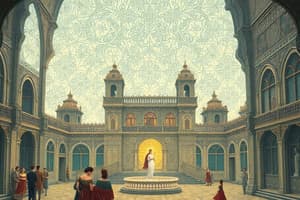Podcast
Questions and Answers
The Medici family ruled Florence for more than 80 years.
The Medici family ruled Florence for more than 80 years.
False (B)
Nicolaus Copernicus is known for his work on the moons of Jupiter.
Nicolaus Copernicus is known for his work on the moons of Jupiter.
False (B)
Leonardo da Vinci was the only painter to create 'The Last Supper.'
Leonardo da Vinci was the only painter to create 'The Last Supper.'
True (A)
Galileo was placed under house arrest due to his support for a geocentric universe.
Galileo was placed under house arrest due to his support for a geocentric universe.
Desiderius Erasmus was a contemporary of Leonardo da Vinci.
Desiderius Erasmus was a contemporary of Leonardo da Vinci.
Renaissance ideas started spreading from Italy to Africa in the 15th century.
Renaissance ideas started spreading from Italy to Africa in the 15th century.
Rene Descartes is referred to as the father of modern mathematics.
Rene Descartes is referred to as the father of modern mathematics.
Michelangelo was one of the Medici family's most notable patrons.
Michelangelo was one of the Medici family's most notable patrons.
The Renaissance is often referred to as a period of cultural, artistic, political, and economic "rebirth" following the Middle Ages.
The Renaissance is often referred to as a period of cultural, artistic, political, and economic "rebirth" following the Middle Ages.
The Middle Ages were primarily a time of enlightenment and rapid scientific advancement in Europe.
The Middle Ages were primarily a time of enlightenment and rapid scientific advancement in Europe.
Humanism, which began in the 14th century, emphasized the importance of man's achievements in science, arts, and education.
Humanism, which began in the 14th century, emphasized the importance of man's achievements in science, arts, and education.
The invention of the Gutenberg printing press in 1450 helped circulate ideas and texts quickly throughout Europe.
The invention of the Gutenberg printing press in 1450 helped circulate ideas and texts quickly throughout Europe.
The Renaissance had no impact on the decline of support for the church in Europe.
The Renaissance had no impact on the decline of support for the church in Europe.
Francesco Petrarch and Giovanni Boccaccio were early humanist authors known for their works that revived ancient Greek and Roman culture.
Francesco Petrarch and Giovanni Boccaccio were early humanist authors known for their works that revived ancient Greek and Roman culture.
The Renaissance period spanned from the 12th century to the 15th century.
The Renaissance period spanned from the 12th century to the 15th century.
In the Renaissance, international finance and trade did not significantly influence culture in Europe.
In the Renaissance, international finance and trade did not significantly influence culture in Europe.
Flashcards are hidden until you start studying
Study Notes
Overview of the Renaissance
- The Renaissance spanned from the 14th to the 17th century, marking a cultural, artistic, political, and economic rebirth in Europe.
- Notable for the revival of classical philosophy, literature, and art, bridging the Middle Ages and modern civilization.
Middle Ages Context
- Often referred to as the "Dark Ages," lasting from the fall of Rome in 476 A.D. to the 14th century.
- Characterized by minimal advancements in science and art, along with turmoil from wars, famine, and pandemics like the Black Death.
- Some historians dispute the extent of the negativity associated with this era, arguing there were notable developments.
Humanism
- Emerged in the 14th century, primarily in Italy, emphasizing the importance of human achievements in various fields.
- Humanism positioned man as the center of his own universe, promoting the value of education, classical arts, literature, and science.
- The invention of the Gutenberg printing press in 1450 facilitated the spread of humanist texts, enhancing communication and access to knowledge.
Impact on Religion and Society
- The flourishing of cultural and scientific exploration during the Renaissance led to a decline in the Church's absolute authority.
- Intellectual curiosity and skepticism of the Church paved the way for the Reformation.
Medici Family
- The Renaissance began in Florence, Italy, supported by affluent citizens like the Medici family, influential patrons of the arts.
- Members of the Medici family promoted artists and thinkers, significantly impacting the cultural landscape of the time.
- Renaissance ideas spread from Florence to other Italian city-states and later to France and beyond.
Prominent Figures of the Renaissance
- Leonardo da Vinci (1452–1519): Renowned Italian painter and polymath known for masterpieces like "The Mona Lisa" and "The Last Supper."
- Desiderius Erasmus (1466–1536): Dutch scholar who became a leading figure of Northern European humanism; translated the New Testament into Greek.
- Rene Descartes (1596–1650): French philosopher and mathematician, regarded as the father of modern philosophy; famous for the statement, “I think; therefore I am.”
- Galileo Galilei (1564–1642): Italian astronomer and physicist known for his telescope discoveries including Jupiter's moons; faced house arrest for his heliocentric views.
- Nicolaus Copernicus (1473–1543): Mathematician and astronomer who proposed the heliocentric model of the solar system.
- Thomas Hobbes (1588–1679): English philosopher and author of "Leviathan," known for his social contract theory.
Studying That Suits You
Use AI to generate personalized quizzes and flashcards to suit your learning preferences.




